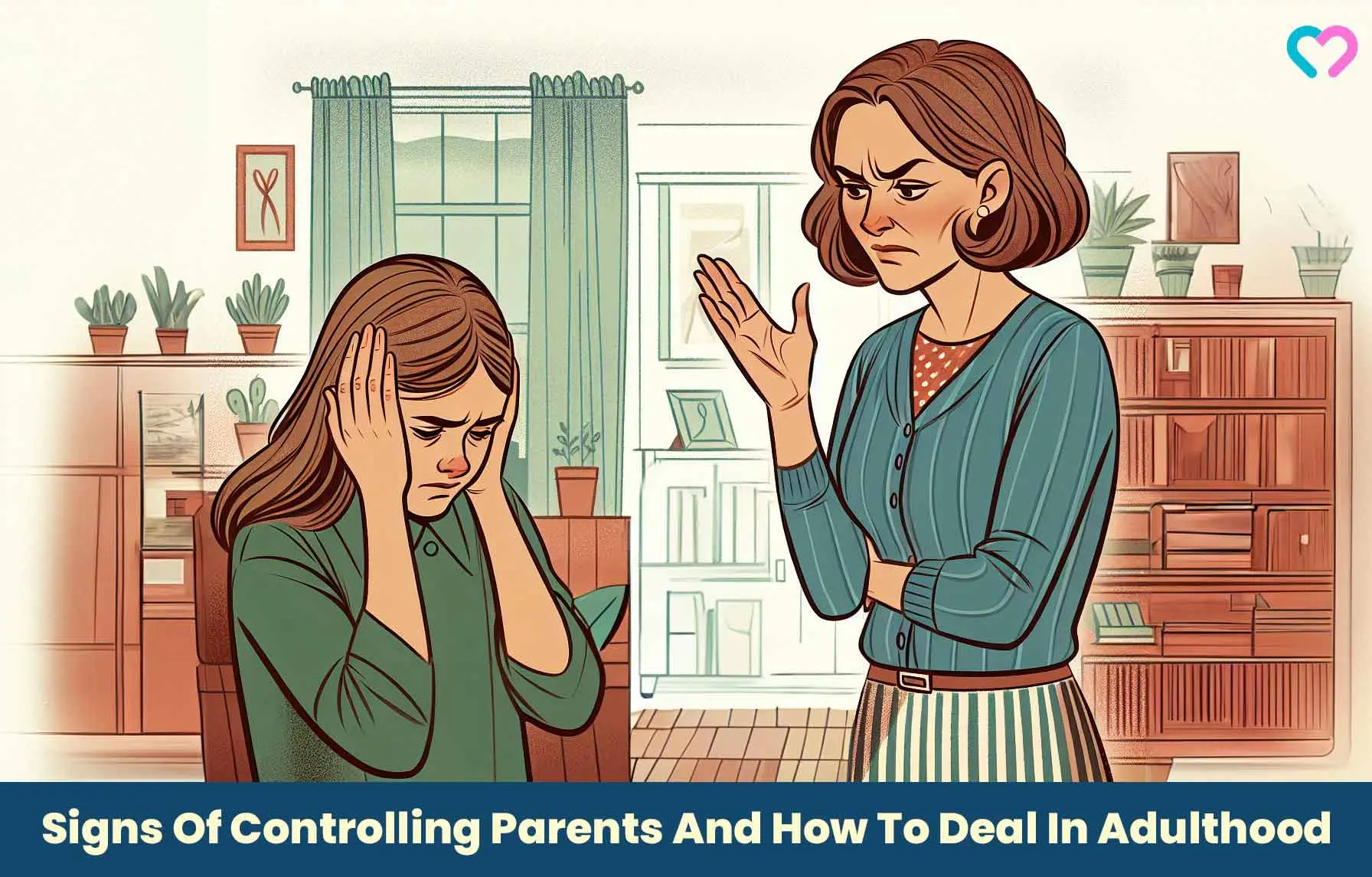
The parents’ constant meddling into children’s decisions and affairs can push them away. Even though controlling parents say things with good intention, it often comes across as nagging, pushy, and authoritative. For example, telling their kids to choose science over arts, deciding who they need to be friends with, or taking care of their finances can be signs of parents controlling their children’s lives.
While they have their concerns for children, controlling can create a stressful condition for the latter. Let’s discuss parents who are overbearing and controlling and tips to deal with them in the right way.
Key Pointers
- Controlling parenting could leave an adverse impact on children.
- Being manipulative, lacking empathy, and not giving them privacy are a few signs of controlling parents.
- Know that you can’t please your controlling parents, so establish your identity and refuse to comply with their demands.
Controlled Parenting: What Is It?
Controlled parenting is a style in which one or both parents monitor their children’s activities or keep their lives under their control. It is also referred to as authoritarian parenting, where the parents focus on discipline and are strict and unyielding about adhering to rules and regulations. Such rigid parents may be detached from the needs of their children, and their overall conduct could be damaging for the children (1).
While some parents may get over this behavior when their children grow into adults, some of them may try to control their grownup children too. In the International Journal of Environmental Research and Public Health, it was seen that children who feel highly controlled are six times more likely to develop internalizing disorders and 4.8 times more likely to exhibit externalizing issues. Boys, in particular, have a higher risk of externalizing problems under excessive control (2). This highlights the need for balanced parenting to support healthy emotional development.
Signs Of Controlling Parents
With time, and as the child matures into an adult, the relationship between the parents and the adult child should evolve. Otherwise, the equation may disintegrate, as may be the case with controlled parenting. Some signs of controlling parents are:
1. Your parents manage your responsibilities
You are an adult now, and you can manage your responsibilities, be it commuting alone, cleaning your space, or taking care of your finances. But if your parents are always trying to do your tasks, they may be trying to control you.
2. Your parents always have an opinion on you

Image: Shutterstock
Do your parents tell you what to eat, what to wear, or even what career you should pursue? Do they judge you, have an opinion about everything you do or say, and try to change your outlook to match theirs? Then, your parents are probably controlling and bossy.
It is good to have guidance when you are a child, but when you are a grownup, such opinions may seem overpowering and could always leave you in a state of dilemma. Eventually, you would end up becoming dependent on their approval and may have difficulty making sound decisions on your own.
3. Your parents lack kindness or empathy
Controlling parents do provide necessities to their children but may fail to understand them. They may not be empathetic to you, probably due to their busy lifestyles or not wanting to lose their authority over you.
4. Your parents don’t give you privacy

Image: Shutterstock
Give space to each other. This fundamental rule applies to a relationship between parents and adult children too. If either of your parents is invading your privacy, it could be due to their controlling nature. Some of the examples could be your parents stalking you on Facebook or other social media sites, reading your emails, or listening to your calls. Remember, there is a thin line between your parents keeping a tab on your online activities when you were a child and interfering and reading your messages after you grow up.
5. Your parents are manipulative
If your parents are pressurizing, shaming, or blaming you often, it could be a sign of controlled parenting. This behavior is a covert or passive form of parenting as the child is forced to do something that they do not want to.
They may do this through different forms of manipulation, such as personal attacks (psychological control, emotional blackmail), love withdrawal (not showing care or affection), or invalidating feelings (acting superior).
 Point to consider
Point to consider6. Your parents make you feel obligated
When parents keep reminding you that they have done a lot for you, you may feel obligated to do what they ask of you. But if what they want from you is against your wishes, it could be a form of controlling parenting.
7. Your parents dominate you

Image: IStock
If your parents are still trying to overpower you by rejecting your ideas or by compelling you to do something against your wishes, then it is a sign of control. For instance, if your parents force you to try a cuisine that you don’t enjoy, it is a sign of dominance.
Research states that controlling parents often dominate their children, leading to stress, peer pressure, and relationship struggles. A lack of positive parenting can impact emotional regulation and behavior. Effortful control in parenting is crucial for a child’s cognitive development. Rather than dominance, healthy guidance fosters growth and independence (3). Dealing with a parent’s controlling behavior becomes necessary to prevent damage to your relationship with your parents and harm to your future relationships.
Casey, a wife and mother, explains the immense controlling nature of her family in her younger days. She shares, “My family attempted to control every aspect of who I was, from my bookish nature, to my lack of style in my clothes and hair, to the choices of boyfriends and the choice of universities I wanted to attend.”
The dominating nature of parents can also make children rebellious. Expressing how she reacted to the repressive nature, Casey says, “And since nothing I did was good enough, I really didn’t try that hard to conform (i).”
8. Your parents emotionally blackmail you
Controlling parents often resort to emotional blackmail when other methods fail to yield desired control over their children. They take you on a guilt trip whenever you fail to live up to their expectations and constantly remind you of the sacrifices that they made for you. Your efforts are never enough, and they play the victim card to gain sympathy. They give you a silent treatment when their demands are not met and disconnect from you till you give in to their demands. They may also give threats or ultimatums, constantly question your choices, and compare you with others. In addition, they often use love and emotional outbursts to manipulate you.
Emotionally blackmailing parents use guilt and pressure to control their children. Research from the University of Virginia shows that teens raised by psychologically controlling parents often struggle with relationships and academics later in life. This manipulation can lead to long-term emotional challenges (4). Recognizing these signs is the first step toward setting healthy boundaries.
How To Deal With A Controlling Parent?
You don’t have to quarrel or rebel. Taking a few subtle steps can provide you the much-needed relief.
1. Determine the pattern of your parent’s behavior
Instead of reacting to your parent’s behavior, it is necessary to identify and understand the reason behind it. Are they attacking you verbally or psychologically, or being aggressive? Once you identify the behavior pattern, give a name to it. Naming it can help you connect it with the reason behind their behavior.
For instance, they may want to keep tabs on you or stay connected with you at all times because they may be feeling lonely or fear losing you. Rather than being harsh on them for that, you could assure them that you are always there for them and explain how their dominating or controlling behavior is affecting you.
2. Claim your identity
If you are in your twenties and think your parents’ controlling behavior is impacting the critical decisions of your life, then maybe you should put a stop to it soon. When your parent’s controlling behavior takes over your life, you may lose your identity.
So, think about what you want in life, what you like and dislike, and talk about it with your parents. Let them know where your happiness lies, what you want to do, and how they can support you.
3. Do not give in

Image: Shutterstock
Emotional blackmailing or manipulation is one of the clear signs of bad parenting. Talk to them and stop it. Let them know firmly, but gently, what you need from them. It is essential to be strong when your future and life are at stake. Act soon to avoid regretting later.
4. Keep actions above emotions
Dealing with complicated situations in life can be overwhelming. But getting emotional about such situations may not always help. When you are not happy with the controlling nature of your parents, you should talk to them instead of being silent and building resentment. So the next time your parents take over and make a decision for you against your wishes, tell them about it.
You may not want your parents to feel bad about it, but it is essential to let them know that you want to live life on your terms. Especially when you are an adult and capable of making decisions about yourself and your life, their controlling behavior could also draw an emotional wedge between you.
5. Understand that you can’t always please them
It is okay to seek love and approval from parents for things you do, but expecting the same every time may not be a good idea.
Before you know it, you could be living your life for your parents and not yourself. As an adult, you have your individual opinions, and it is okay to have differences. So don’t lose heart even if they don’t approve of everything you do.
6. Set up healthy boundaries with parents

Image: Shutterstock
A healthy parent and child relationship should have established boundaries, especially when you are an adult. With boundaries in place, the relationship becomes transparent and cheerful. There would be no dependency, expectations, financial tangles, or any other ill feelings. The bond would be positive without any significant hiccups.
Relationships should be handled with care, especially the most precious one with our parents. If you think your parents are controlling and that is hurting the relationship you have with them, talk to them about it.
Sometimes, you may need support from a therapist, counselor, or a person you trust to handle controlling parents. You may also consider joining support groups or online communities to gain insights from others facing similar challenges.
Why Do Parents Become Controlling?
Often, the parents may not realize that their behavior is hurting the child. Not all parents become controlling because of their selfish or self-opinionated desires. There could be varied reasons behind such a possessive style of parenting. Some may stem from negative experiences, while others could be from positive situations.
- Some parents could become controlling and intrusive because they don’t want their children to commit mistakes in life. And so, they tend to become overprotective. The parenting style of these parents fall under the category of “helicopter parenting.” This “helicopter parenting” approach, though well-intended, may negatively impact a child’s mental well-being, leading to anxiety and depression (5). This approach can limit independence and create emotional stress. Balancing guidance with autonomy is key to healthier development.
- Another reason could be the fear of losing children. They could be afraid of staying away from their children when they grow up. In such a case, they try to control and see that the child is always with them.
- Some parents may not want to lose their ego or superiority or may not want to treat their children equally even after they grow up. They might be lonely too and might want their children to be there for them whenever they need them.
- Parents have strong ideas about their children’s lives because they are hoping that their children live out things they never did. This pressure can shape a child’s choices, sometimes at the cost of their own desires.
- Many U.S. parents raise their children in a similar way to how they were raised (43%), while almost as many try to take a different approach (44%). Only a small percentage (12%) say they are neither following the same nor different methods (6). This dynamic can sometimes lead to controlling behaviors as parents navigate their own upbringing and goals for their children.
Sometimes, they may have a few unreasonable expectations that may turn them into controlling parents. Irrespective of the intention, the effect of controlled parenting could be unfavorable.
Frequently Asked Questions
1. Can strict parents cause trauma?
Overly strict parenting may have a negative impact on children. Some children may become aggressive and rebellious. While others may experience trauma and find it difficult to socialize, make their own decisions, and be confident as they grow (7). So, it is important for parents to be friendly with their kids and empathize with them.
2. What is it called when parents are controlling?
When parents are highly controlling, it is known as an authoritarian parenting style. This type of parenting focuses on the child following a set of rules without compromise. Here, obedience equals love from the child’s side (7).
3. Are there any benefits to controlling parenting?
Controlling parents may offer some benefits in terms of safety. These children may also have more academic achievements and learn self-control.
Having restrictive or controlling parents when you are an adult may affect your growth as an independent and responsible individual. Although their intentions may be good, their demanding actions may become too strong. So if your parents are constantly meddling in your personal life and displaying the above behaviors, do not hesitate to confront them. It is necessary to express your emotions and let them know where they are going wrong. Follow the subtle steps towards building a healthy relationship with your parents for a better and peaceful life.
Infographic: Effective Strategies For Dealing With A Controlling Parent
While having controlling parents during childhood can be beneficial up to a point, this parental behavior may cause conflicts and negatively impact children’s emotional and social growth in later years. Let’s take a look at the infographic below to learn some simple yet effective strategies to help you deal with your controlling parents. Illustration: Momjunction Design Team
Illustration: How To Deal With A Controlling Parent In Adulthood?

Image: Stable Diffusion/MomJunction Design Team
Are your parents controlling your life? Learn the 5 signs that confirm you have controlling parents in this video!
Personal Experience: Source
MomJunction articles include first-hand experiences to provide you with better insights through real-life narratives. Here are the sources of personal accounts referenced in this article.
i. If you had controlling parents;https://thesprightlywriter.wordpress.com/2014/01/22/if-you-had-controlling-parents/
References
- C. Merlin, J. R. Okerson, and P. Hess;How Parenting Style Influences Children: A Review of Controlling, Guiding, and Permitting Parenting Styles on Children’s Behavior, Risk-Taking, mental Health, and Academic Achievement; The William & Mary Educational Review (2013)
https://scholarworks.wm.edu/cgi/viewcontent.cgi?article=1060&context=wmer - Benito León-del-Barco et al; Parental Psychological Control and Emotional and Behavioral Disorders among Spanish Adolescents; International Journal of Environmental Research and Public Health
https://pmc.ncbi.nlm.nih.gov/articles/PMC6388244/ - Purva D. Lanjekar et al; The Effect of Parenting and the Parent-Child Relationship on a Child’s Cognitive Development: A Literature Review; Cureus
https://pmc.ncbi.nlm.nih.gov/articles/PMC9678477/ - Jane Kelly; Study: Overbearing Parents Lead to Long-Term Struggles With Relationships, Education; University of Virginia
https://news.virginia.edu/content/study-overbearing-parents-lead-long-term-struggles-relationships-education - Julia Schønning Vigdal et al; A Systematic Review of “Helicopter Parenting” and Its Relationship With Anxiety and Depression; Frontiers in Psychology
https://pmc.ncbi.nlm.nih.gov/articles/PMC9176408/ - Kiley Hurst,Dana Braga,Shannon Greenwood,Chris Baronavski and Michael Keegan; How Today’s Parents Say Their Approach to Parenting Does – or Doesn’t – Match Their Own Upbringing; Pew Research Center
https://www.pewresearch.org/social-trends/2023/01/24/how-todays-parents-say-their-approach-to-parenting-does-or-doesnt-match-their-own-upbringing/ - Authoritarian parenting style; Michigan State University
https://www.canr.msu.edu/news/authoritarian_parenting_style
Community Experiences
Join the conversation and become a part of our nurturing community! Share your stories, experiences, and insights to connect with fellow parents.
Read full bio of Scott Kouri
Read full bio of Shikha Thakur
Read full bio of Siddharth Kesiraju
Read full bio of Apoorva K


















